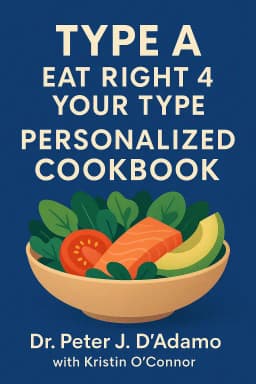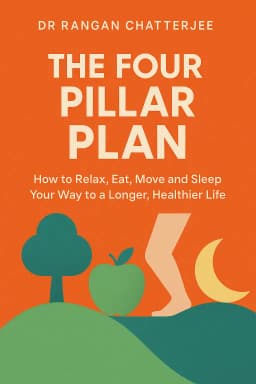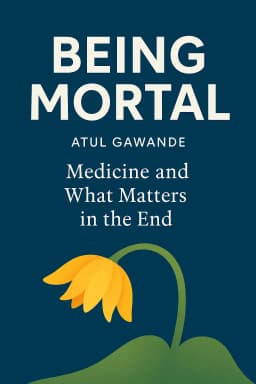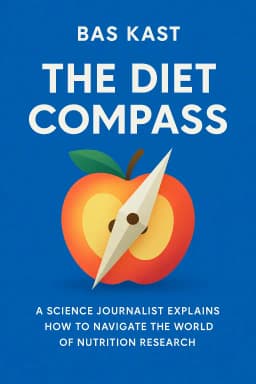
The Great Diet Deception
Golden Hook & Introduction
SECTION
Laura: A massive, government-funded study put nearly fifty thousand women on a low-fat diet for eight years. They dutifully cut about 360 calories a day. The result? They lost an average of just two pounds. And their waists actually got bigger. Sophia: Wait, hold on. Eight years of effort for… two pounds and a bigger waistline? That’s not just a failure, that’s a cruel joke. What on earth is going on? Laura: That is the exact question that drives Gary Taubes in his book, Why We Get Fat: And What to Do About It. And Taubes is the perfect person to ask. He's not a nutritionist; he's an award-winning investigative journalist with a background in applied physics from Harvard. He approaches this not as a diet guru, but as a detective trying to solve a scientific mystery. Sophia: A physicist investigating fat. I like that. It suggests he's looking for first principles, not just repeating what everyone else says. Laura: Exactly. And the first clue he uncovers is that the central piece of advice we've all been given—the mantra of our times—is fundamentally broken.
The Great Deception: Why 'Eat Less, Move More' is a Flawed Mantra
SECTION
Sophia: You mean 'eat less, move more.' It feels like the most basic, undeniable common sense. How can that be wrong? Laura: Well, it feels like common sense, but the evidence says otherwise. Taubes walks us through study after study showing its spectacular failure. That Women's Health Initiative trial is the star exhibit. We're talking about a massive, expensive, long-term study. The women did what they were told—they ate less fat, more fruits, vegetables, and grains. They cut calories. And for all that effort, the results were negligible. Sophia: But the immediate reaction is to say, "Well, they must have cheated." Or maybe they didn't track their calories perfectly. It's easy to blame the individual. Laura: Of course, and that's the default explanation. But Taubes points out this pattern is everywhere. He brings up a review from 1959 by a psychologist named Albert Stunkard. Even back then, after reviewing all the available studies on calorie-restricted diets, Stunkard concluded the results were remarkably poor. Most patients didn't lose much weight, and those who did almost always regained it. This isn't a new problem; we've known for over 60 years that telling people to just 'eat less' doesn't work long-term. Sophia: Okay, so just eating less is a bust. But what about the other half of the mantra? Exercise. Surely, if you burn more calories, you have to lose weight. That’s just physics. Laura: Ah, and this is where Taubes, the physicist, really shines. He points out a beautiful paradox. What do you do if you want to prepare for a huge feast? Say, a massive Thanksgiving dinner. Sophia: I'd probably skip breakfast and maybe go for a long run to "make room" and work up an appetite. Laura: Exactly! You eat less and exercise more. The very things we're told to do to lose weight are the exact same things we do to increase our appetite and eat more. It's a biological trap. Sophia: Wow. I have never thought of it that way. That’s a perfect example of how our logic gets twisted. Laura: Taubes even shares a story from the 1860s about a famously obese London undertaker named William Banting. His doctor told him to try "increased bodily exertion." So Banting started rowing vigorously on the Thames every morning. He definitely got stronger, but he also developed what he called a "prodigious appetite" and ended up gaining weight. His doctor eventually told him to stop exercising. Sophia: The doctor told him to stop exercising? That would be heresy today! So if it's not about eating less, and it's not about exercising more... my mind is a little blown. This feels like a whodunit, and we've just eliminated the two main suspects. What's left?
The Real Culprit: Introducing 'Adiposity 101' and the Insulin Hypothesis
SECTION
Laura: What's left is biology. Taubes argues we've been trying to solve a biological problem with the wrong tools—the tools of physics. He offers a simple analogy. Imagine you walk into a lecture hall and it's chronically overcrowded. You ask the security guard, "Why is this room always so crowded?" And the guard says, "Well, it's simple. More people are entering than are leaving." Sophia: Okay, that’s… true, but completely unhelpful. It doesn't tell me why more people are coming in. Is there a famous speaker? Is it the only air-conditioned room? Laura: Precisely! Saying we get fat because we take in more calories than we expend is the same kind of useless, circular logic. It's a tautology. It describes the state of being fat, but it doesn't explain the cause. The real question is: what is regulating the flow? Sophia: And that's where the hormones come in. Laura: That's where the hormones come in. Specifically, one master hormone: insulin. This is the core of the book, what Taubes calls "Adiposity 101." He argues that fat accumulation isn't a passive process of calories just piling up. It's an active, tightly regulated biological process. Sophia: So what is insulin's job in all this? I know it's related to blood sugar and diabetes, but that's about it. Laura: Insulin's main job is to manage fuel. When you eat, especially carbohydrates, your blood sugar rises. Your pancreas releases insulin to tell your cells to take up that sugar for energy. But here's the crucial part for fat: insulin is the principal regulator of fat metabolism. It essentially tells your fat cells to store fat and, very importantly, it prevents them from releasing the fat they already have. Sophia: So insulin is like a traffic cop for fat, but it only has one command: 'All fat, get into the storage unit, and nobody leaves until I say so.' It’s a one-way valve. Laura: That's a perfect analogy. An enzyme called lipoprotein lipase, or LPL, sits on the surface of fat cells, and insulin basically flips its 'on' switch, pulling fat out of the bloodstream and into the cell. At the same time, insulin blocks another enzyme inside the fat cell, hormone-sensitive lipase or HSL, which is responsible for letting fat out. So when insulin is high, fat goes in, but it can't get out. Sophia: Okay, that's a clear mechanism. But what triggers this whole process? What makes insulin spike? Laura: In a word: carbohydrates. Fats have very little effect on insulin. Protein has a moderate effect. But carbohydrates—especially sugars and refined starches like bread, pasta, and potatoes—cause a rapid and significant release of insulin. Sophia: And this is where Taubes becomes a really polarizing figure, isn't it? Because he's essentially saying an entire food group is the villain. Critics often accuse him of cherry-picking studies to fit his narrative. Laura: They do. The book has a very mixed reception in the scientific community for that reason. But Taubes argues he's not inventing this idea. He's uncovering a century of research that was pushed aside and forgotten. He's connecting the dots that others ignored. Sophia: What kind of dots? Give me an example that makes this feel real. Laura: He points to rare medical conditions like lipodystrophy. In some forms of this disease, people lose fat from their limbs and face, but accumulate massive amounts of fat in their abdomen and neck. It’s not because they are overeating in their belly and undereating in their arms. It’s a clear sign that specific fat tissues are being hormonally instructed to grow, independent of calorie intake. It proves that fat regulation is local and hormonal, not global and caloric. Sophia: That's a powerful point. It separates the behavior of eating from the biology of fat storage. So the argument is that for many of us, our bodies are being given the hormonal signal to get fat, and the overeating is a consequence of that signal, not the cause. Laura: You've just summarized the entire paradigm shift of the book. We don't get fat because we overeat; we overeat because we are getting fat. Our fat tissue is demanding energy, leaving less for the rest of our body, which makes us hungry and tired.
The Historical Conspiracy and The Path Forward
SECTION
Sophia: It’s a radical idea. But you said this isn't new? That it was forgotten? How does one forget something so fundamental about human health? Laura: It's a fascinating and slightly tragic story of scientific groupthink. Taubes takes us back to the 1820s, to a French lawyer and famous gastronome, Jean Anthelme Brillat-Savarin. Even then, he wrote in his book The Physiology of Taste that the cause of obesity was "floury and starchy substances." He knew. Sophia: The 1820s! So this isn't some new-fad diet. Laura: Not at all. In the 1860s, William Banting—the undertaker who got fat from rowing—finally lost weight on a diet that restricted bread, sugar, beer, and potatoes. His self-published pamphlet on it became a massive bestseller. The diet was so famous that for decades, if you were dieting, you'd say you were "Banting." It was common knowledge that carbohydrates were fattening. Sophia: So what happened? How did we go from "Banting" to bagels and SnackWell's cookies? Laura: The fear of fat and cholesterol happened. In the mid-20th century, the hypothesis that dietary fat, particularly saturated fat, caused heart disease took hold. It became dogma. And if fat was the enemy, then carbohydrates must be the hero. Health authorities started pushing low-fat, high-carb diets as "heart-healthy." The old wisdom was buried under this new, and as Taubes argues, deeply flawed, paradigm. Sophia: And this is the diet most of us grew up on. The food pyramid with bread and pasta at the base. Laura: Exactly. And it coincided perfectly with the explosion of the obesity and diabetes epidemics. Taubes isn't saying it's a deliberate conspiracy, but a case of a scientific community getting locked into a hypothesis and ignoring contradictory evidence for decades. Sophia: So if this model is right, what do we do? If carbohydrates are the primary driver, does that mean we can never eat a piece of bread or a potato again? That sounds… miserable. Laura: It's the million-dollar question. Taubes is very clear: the most fattening foods are the ones that spike insulin the most. That means sugars, first and foremost—soda, fruit juice, sweets. And then easily digestible starches—anything made from white flour, white rice, and starchy vegetables like potatoes. Sophia: So it’s not about demonizing all plants. It’s about the refined, high-impact carbs. Laura: Precisely. The practical advice in the book is to build your diet around foods that don't significantly raise insulin. That means meat, fish, fowl, eggs, and non-starchy vegetables—especially leafy greens. Fats are fine; in fact, they're necessary for energy and satiety. You eat when you're hungry, and you stop when you're full. Because you're not on a semi-starvation diet, your body doesn't fight back with ravenous hunger. Sophia: It's a complete reversal of the food pyramid. The things at the top—fats and proteins—move to the bottom, and the things at the bottom—grains and starches—are the ones to avoid. Laura: It is. And for those who are particularly susceptible to weight gain, what he calls "insulin resistant," the restriction needs to be stricter. But for many, simply eliminating sugars and refined grains can make a world of difference.
Synthesis & Takeaways
SECTION
Sophia: So the big shift here isn't just about what's on our plate. It's about changing how we see obesity itself. It's not a moral failing of gluttony or sloth, but a biological malfunction. Laura: Precisely. Taubes reframes it as a hormonal disorder. The hunger, the cravings, the lethargy that make people overeat and under-exercise—he argues those are symptoms of an underlying problem. The problem is that your fat tissue is being hormonally driven to hoard calories. It's essentially starving the rest of your body, which is what makes you feel hungry and tired. Sophia: That is such a compassionate and, frankly, more logical way to look at it. It removes the blame and shame that is so tied up with weight. Laura: It does. It suggests that for millions of people, their bodies are working against them, and fighting that with willpower is like trying to hold your breath indefinitely. You can do it for a little while, but eventually, biology will win. Sophia: It really makes you wonder how much of our public health policy is based on a fundamental misunderstanding of the human body. What other "common sense" ideas are we getting wrong? Laura: A question worth pondering. This is Aibrary, signing off.









